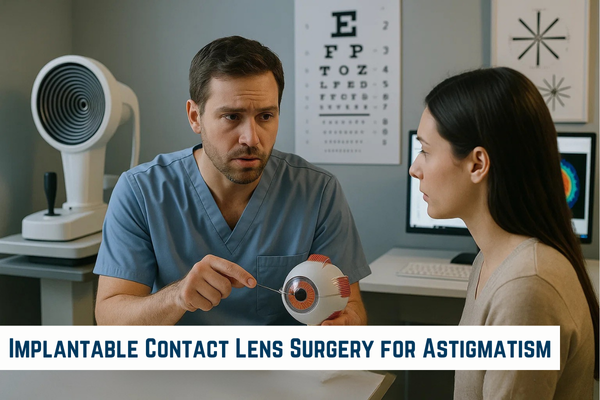Astigmatism, a refractive error caused by an irregular shape of the cornea, can significantly affect vision quality. For many individuals, traditional corrective measures such as glasses or contact lenses are effective, but some individuals experience challenges with comfort and clarity. In recent years, implantable contact lens surgery (ICL surgery) has emerged as a promising solution for astigmatism, offering a more permanent alternative for vision correction.
In this article, we will explore the clinical outcomes of ICL eye surgery for astigmatism, highlight its benefits and discuss the challenges associated with the procedure. Whether you are a healthcare provider or a patient considering surgery, understanding the complexities of implantable contact lenses will help you make informed decisions.
How Does Implantable Contact Lens Surgery Work for Astigmatism?

Implantable contact lenses are surgically placed inside the eye to correct refractive errors like astigmatism. Unlike conventional contact lenses that sit on the surface of the eye, implantable contact lenses (ICLs) are inserted into the eye, typically between the iris and the natural lens. This surgical procedure offers a more permanent solution for individuals with astigmatism and other refractive issues, such as myopia or hyperopia.
For astigmatism, ICL surgery works by providing additional correction to the cornea’s irregular shape. By altering the way light enters the eye, implantable lenses can provide sharper, more focused vision. The lenses can be custom-designed to meet the specific needs of each patient, taking into account the severity of astigmatism, corneal thickness and overall eye health.
The procedure itself is minimally invasive and can be performed under local anesthesia, with patients often experiencing a relatively quick recovery time. During the surgery, the surgeon makes a small incision in the cornea, inserts the ICL lens and ensures proper positioning before closing the incision. As a result, patients can experience clearer vision without the need for glasses or external contact lenses.
Why is Implantable Contact Lens Surgery for Astigmatism Gaining Popularity?
The increasing popularity of implantable contact lens surgery for astigmatism in the UK can be attributed to several factors. First, many individuals who suffer from astigmatism experience limitations with traditional corrective methods such as glasses and contact lenses. While these solutions may be effective to a degree, they don’t always address the root cause of the refractive error and often require constant maintenance, such as frequent lens replacements or cleaning.
ICL surgery for astigmatism provides a more permanent solution by placing the implantable lens inside the eye. This eliminates the need for daily lens care and offers patients a higher level of convenience. Additionally, because implantable contact lenses are tailored to the individual’s eye structure, they can provide superior comfort and vision clarity compared to external lenses.
Moreover, advanced ICL surgery has significantly reduced the risks associated with the procedure. Over time, the technology and techniques used in ICL surgery have improved, resulting in better clinical outcomes. These advancements have helped build patient trust and increase the popularity of implantable contact lenses as a treatment for astigmatism.
Testimonials
“Extremely gentle, professional and informative, Could not wish for more“
When Should You Consider Implantable Contact Lens Surgery for Astigmatism?
Some indicators that ICL surgery for astigmatism might be a suitable choice include:
- Chronic Astigmatism: If astigmatism cannot be adequately corrected with glasses or conventional contact lenses, implantable contact lenses may offer a more permanent solution.
- Poor Tolerance to External Lenses: Some patients experience discomfort or vision instability with traditional contact lenses, making implantable lenses a better option.
- Desire for a Permanent Solution: For individuals who are tired of the ongoing need for corrective eyewear, implantable contact lenses offer the benefit of long-term correction with little need for maintenance.
However, not everyone is a candidate for implantable contact lens surgery. Individuals with certain eye conditions, such as severe dry eye, glaucoma or cataracts, may not be suitable candidates. A thorough consultation with an ophthalmologist or eye surgeon is essential to determine whether the procedure is appropriate.
Where Can You Find Implantable Contact Lens Surgery for Astigmatism in the UK?
In the UK, implantable contact lens surgery is offered by a variety of private clinics and medical centers. These specialized centers are staffed by qualified surgeons who are experienced in performing ICL eye surgery for astigmatism and other refractive errors. Many clinics offer comprehensive consultations to evaluate your suitability for the procedure, providing personalized recommendations based on your eye health and vision needs.
It’s important to seek out clinics with a proven track record in ICL surgery and one that uses the latest technology to ensure the best possible outcomes. Look for centers that offer a full range of services, including pre-surgery assessments, advanced diagnostic tools and post-surgery care to ensure a successful recovery.
Client Speaks
“I am confident about this doctor“
What Are the Clinical Outcomes of Implantable Contact Lens Surgery for Astigmatism?
The clinical outcomes of implantable contact lens surgery for astigmatism have been overwhelmingly positive, with many patients reporting improved vision clarity and reduced dependence on corrective eyewear. Research and clinical studies have shown that ICL surgery can significantly improve visual acuity, often resulting in better vision.
One of the key advantages of implantable contact lenses is their ability to correct astigmatism effectively and consistently. Unlike traditional contact lenses that sit on the surface of the eye and can shift or become displaced, implantable lenses are securely positioned inside the eye, providing stable and reliable vision correction. Furthermore, because these lenses are custom-designed for each patient, they offer a high degree of precision in addressing the specific refractive error.
Another important clinical outcome of ICL surgery is the relatively low incidence of complications. The procedure has been shown to have a high success rate, with most patients experiencing minimal discomfort and a short recovery time. For individuals with high levels of astigmatism or other complex vision issues, advanced ICL surgery techniques may offer even greater precision and effectiveness.
What Are the Challenges of Implantable Contact Lens Surgery for Astigmatism?

While implantable contact lenses offer numerous benefits, there are also certain challenges and risks associated with the surgery. Some of the challenges include:
- Surgical Risks: As with any surgical procedure, there are inherent risks involved, including infection, bleeding or lens displacement.
- Post-Surgery Complications: Although rare, some patients may experience complications such as elevated eye pressure or cataract formation following surgery.
- Cost: The implantable contact lens cost can be significant and many patients may find the procedure more expensive than traditional vision correction options. However, the long-term benefits of improved vision and reduced dependency on glasses or contacts often outweigh the initial investment.
- Recovery Time: While the recovery period is generally short, patients may need to follow strict post-operative care instructions to minimize the risk of complications.
Conclusion
Implantable contact lens surgery for astigmatism represents a major advancement in vision correction technology. With its ability to provide a permanent, stable solution for astigmatism, ICL surgery has proven to be a reliable and effective treatment for many patients. While there are challenges associated with the procedure, the positive clinical outcomes and the growing number of successful surgeries make it a highly viable option for individuals seeking long-term relief from astigmatism.
If you are considering implantable contact lens surgery for astigmatism, it is essential to consult with a skilled ophthalmologist or eye surgeon to evaluate your specific needs and determine the best course of action.
Frequently Asked Questions - Contact Lens Surgery for Astigmatism
Q1. How long does the recovery process take after ICL surgery for astigmatism?
A. Most patients experience a relatively quick recovery, with noticeable improvements in vision within a few days. Full recovery typically takes one to two weeks.
Q2. Are there any risks associated with implantable contact lens surgery for astigmatism?
A. While the procedure is generally safe, there are risks such as infection, lens displacement and changes in eye pressure. However, these risks are rare and can be minimized with proper care.
Q3. How long do implantable contact lenses last for astigmatism correction?
A. Implantable lenses are designed to last for many years, offering a long-term solution to astigmatism. In most cases, they provide stable vision for over a decade.
Q4. Can implantable contact lens surgery correct other vision problems aside from astigmatism?
A. Yes, ICL surgery can be used to correct other refractive errors, including myopia (nearsightedness) and hyperopia (farsightedness).
Q5. Is ICL surgery for astigmatism covered by insurance?
A. Insurance coverage for ICL surgery may vary depending on the policy and provider. It’s best to check with your insurance company to determine coverage options for the procedure.
